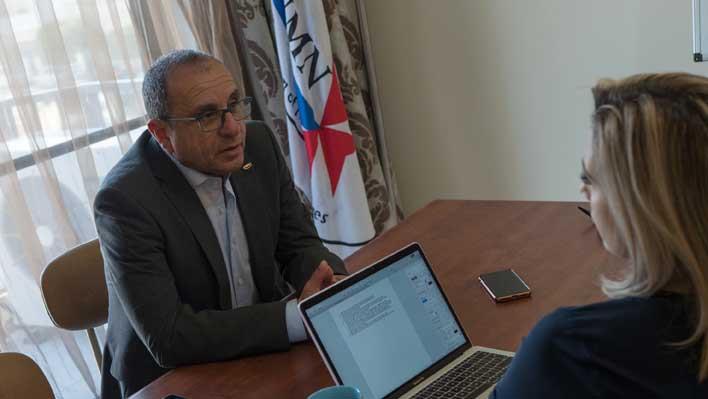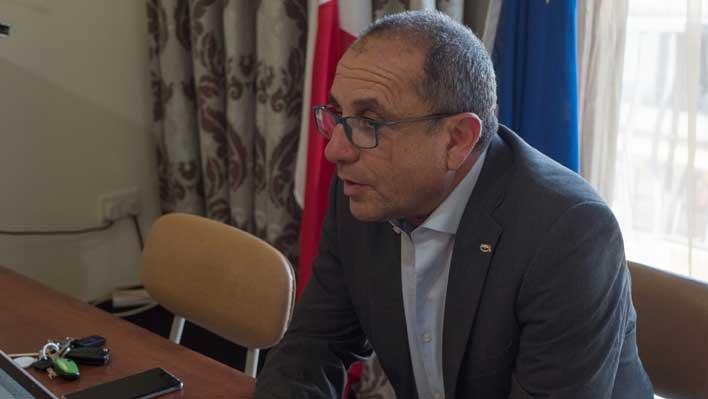The Health Ministry had told the Malta Union for Midwives and Nurses (MUMN) that there were no plans to bring Libyan patients to Malta but the situation on the ground showed otherwise, said MUMN President, Paul Pace.
Referring to a MUMN statement earlier last month, that Mater Dei Hospital was gearing up to receive Libyans injured in ongoing clashes in Tripoli, Pace said: “Our nurses are neither blind, not liars. They saw corridors being prepared with empty beds for an emergency.”
Talking in a wide-ranging interview with The Malta Independent on Sunday to discuss the current nursing situation in the health sector, Pace insisted that whilst the nurses were seeing these preparations, the Health Minister had assured them that no Libyan patients were coming. “People were getting alarmed,” said Pace, so he called the CEO of Mater Dei Hospital.
He said that, during this conversation, the CEO confirmed that there were a lot of ships around Malta that could have injured people onboard. “He just avoided using the word ‘Libya’,” said Pace.
Pace noted that it was only then that the statement was issued. “We do not speak irresponsibly, we knew the situation.”
“They could not deny that the beds were being prepared,” Pace said, adding that “maybe you could say that the CEO took it on himself to prepare them.”
On 10 April, The Malta Independent, quoting Mater Dei Hospital senior management, reported that there were no plans to bring over injured Libyans to Malta.
Asked why the MUMN was making statements that could be misinterpreted as being racist, Pace explained that “we would have big problems if the Libyans had to come.”
He said that Malta had experienced this situation six years ago and it had been “disastrous”.

Pace pointed out that countries with far more – and better – medical facilities than Malta did not accept Libyan patients, the reason being that “these patients had multi-resistant organisms, which were brought into Malta and they still sometimes kill.”
He said that we had brought the Libyan patients to Malta without prior planning and that he was the only person in the country screaming “this is crazy.”
The first group of patients were not screened six years ago. “They had the bug from the Klebsiella family that is still with us to this very day. The same would have happened today.”
Should the Libyan patients have arrived in Malta, the MUMN would have not issued directives. According to Pace, there had already been calls for nurses to work overtime because of these patients.
The problem is, however, that nurses are already refusing to work overtime with the current situation. “If they brought in one or two patients it would not have made a difference, but if there had been 30 patients, most maybe ITU cases, there would have not been enough staff.”
He emphasised that this is not something against Libyans but because Malta has to work with the human resources it has. “Either politicians are in denial or they do not know the feelings on the ground. We would have left everyone free but they would have found no nurses.”

Speaking about non-EU nurses working in the health sector, Pace said that there is a huge cultural and language barrier. Although the Health Department has tried to address the problem by arranging for a language course: “I haven’t heard any of them speaking Maltese.”
The problem is even worse because English is not their first language, Pace explained. When they were in small numbers they could have easily mixed in and not affected the service. Now, however, it is not just the nurses who are foreign but also the carers, the maids and even the doctors.
“This is a problem because sometimes there is only one Maltese nurse, or none at all. Not all Maltese are highly literate in English, not enough to explain their symptoms. You can be able to speak English but you have to be highly fluent to explain any signs and symptoms, which is not so easy.”
It seems that the issue does not only apply to the older generation but also to younger people, although it is more acute in nursing homes.
Culturally there also seems to be an issue, with Pace taking Mount Carmel as an example, saying that: “You need a tough Maltese character to approach the patients. If you are a foreigner, you might be bullied or abused because they see you as weak.”

Non-EU nurses account for 20 per cent of nursing staff
Despite the apparent barriers, non-EU nurses make up 20 per cent of the nursing staff. Pace, however, says that nursing staff numbers are now so low that “we are now dependent on these foreign nurses,” and more need to be recruited.
The situation is getting worse, despite the marketing efforts by the MUMN. Currently, there is not one department that has a full complement of nursing staff, according to Pace. Wards should have six nurses in total, apart from the two nurses in charge, but at the moment only two or three nurses are working at any one time, out of a total of eight.
Whilst this situation is the same across the health sector, Mater Dei Hospital is by far the worst. This is especially true in the Intensive Therapy Unit (ITU), where there should be one nurse to every patient. Last week the MUMN issued a series of directives to its members working in ITU as a “long-standing” shortage of 15 nurses persists. The situation in this department is now so dire that the union said it fears that a major incident would mean it would not be able to cope with the influx of patients.
Pace explained that the ITU can accommodate 22 patients but there are only eight nurses. He added that this is not a ‘one-off’, or a ‘bad day’ but a situation that has existed for quite a while.
When asked what is causing the shortage in the number of nurses, Pace said it is a multi-faceted problem. While more nurses are being employed, more are retiring and 80 per cent of the nurses are female and of child-bearing age. While the family-friendly measures are a very good initiative they do have consequences on the service. The Ministry speaks of numbers but some nurses work reduced hours so more staff are required to replace them for the rest of the hours, he explained. Pace also spoke about those taking maternity leave which – he insisted – they have every right to do, but it also affects the service. Again he, insisted that these measures were all positive because if they were not in place these nurses would have just abandoned the service, “which would have been worse.”

The majority of nurses are raising children and Pace says that doing this on a roster basis is very hard. “With all the equality we talk about it all falls on the women,” to raise children, he said, adding that they have very few male nurses wanting to change their rosters because of their children.
In addition, female nurses coming back from maternity leave and going on to reduced hours lose their ward and their speciality, ending up in the relief pool. “So she is coping with a new family, perhaps continuing her studies and then ends up de-motivated in a relief pool. It is no wonder they leave.”
This year, 180 new nurses should be graduating from the University of Malta and they will be employed in August. Should they all pass their exams there would still not be enough nurses to deal with the demands.
Asked what the MUMN hopes to achieve by issuing directives, Pace said that they are not issued to resolve problems but rather as “a way of letting out their anger that they [nurses] are being ignored. The ITU nurses do not usually complain, they are not militant and are highly specialised in their work, so when they complain you know the problem is very serious.”
Pace explained that because the ITU is a very stressful place in which to work, and because there is a high mortality rate amongst the patients, the MUMN does not like issuing directives for the area. “We try to send a signal rather than make changes related to the care of the patient. Shrouding is one of the directives that is effected, which is after death. It is more like a message that things are not well.”
Another issue is that non-EU nurses tend to take long holiday leave, which is expected since they need to travel a long way in order to see their family. “We depend on them so we have no choice really. If these foreigners were to leave, part of our health service would collapse.”

Applicants for a call for non-EU nurses already employed locally
Asked if more non-EU nurses could be employed, Pace said that a new call for 200 nurses had been issued but the call had stalled. According to him, all the applicants were already employed locally by Steward Healthcare or other private companies.
“They prefer working for the government than for private companies” said Pace. The last time agencies had been involved, but this had not been the case this time, he explained, adding that Malta is not the only country “poaching” nurses from non-EU countries. These other countries, including America, pay much higher wages so they get the best nurses, he said, adding that, in addition, they have have aggressive recruitment campaigns, not campaigns run by the government. They have databases of all the students and try to poach them even before they graduate.
One solution Pace suggested in view of the shortage of nursing staff is the introduction of a new nursing course with Northumbria University.
With the permission of the Ministry, Pace brought this University to Malta whose entry qualifications are different from those required by the University of Malta. They use the British system which is based on BTEC, he explained.
“We always get the same numbers at the University of Malta, so we had to look elsewhere,” he said.
It takes three years to finish this course so next year there will be another 30 nurses. At the moment the course is taking place at MCAST, with the certificates being issued by Northumbria University. Eventually, they should have their own campus.
Bureaucracy seems to be another issue when it comes to nursing staff shortages. “We lose nurses because of day-to-day problems – for example, one person is given a particular roster but the other is not,” said Pace. He explains that this results in demotivation, which results in nurses losing their vocation and turning to other careers, such as i-gaming.